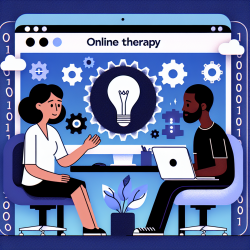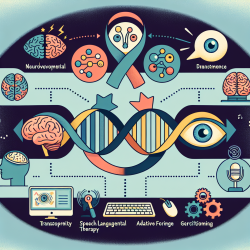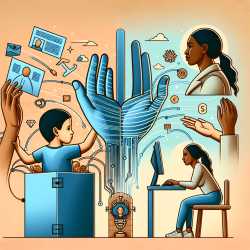The landscape of psychological therapy is evolving, and online interventions are at the forefront of this transformation. The research article, "IAPT and the internet: the current and future role of therapist-guided internet interventions within routine care settings," offers valuable insights into the efficacy and implementation of these digital therapies. Here, we explore key findings from the study and provide actionable steps for practitioners to enhance their skills and embrace the future of mental health care.
Understanding Therapist-Guided Internet Interventions
Therapist-guided internet interventions are online programs designed to deliver therapy content similar to traditional face-to-face sessions. These programs can include text, audio, video materials, and interactive exercises. The guidance from a trained therapist typically involves regular written feedback, support, and advice on progressing through the program.
Why Online Therapy is Beneficial
Online therapy offers numerous advantages:
- Flexibility for clients to engage in therapy at convenient times and locations.
- Reduced travel time and costs, allowing more time for therapeutic activities.
- Consistency in delivering therapy content, enhancing the reach of psychological treatments.
- Potential to treat more clients efficiently, improving access to evidence-based therapies.
Implementing Online Interventions: Key Considerations
Successful implementation of online interventions in routine care settings requires careful planning and consideration of several factors:
Choosing the Right Programs
Select programs that are evidence-based, comply with data security requirements, and are user-friendly for both clients and therapists.
Providing Adequate Therapist Training
Ensure therapists receive comprehensive training on the specific program, including its technical aspects, communication methods, and strategies for maintaining client engagement.
Addressing Practical and Organizational Issues
Consider the integration of online interventions within existing service structures, including referral pathways, supervision arrangements, and technical support systems.
Overcoming Common Beliefs and Concerns
Practitioners may have reservations about the effectiveness of online therapies compared to face-to-face sessions. However, research shows that therapist-guided internet interventions can be just as effective, with strong evidence supporting their efficacy for anxiety and depression.
Strengthening the Therapeutic Alliance
Studies indicate that a strong therapeutic alliance can be developed online, with clients reporting positive relationships with their therapists. Personalized and encouraging communication is key to building this alliance.
Suitability for Severe Problems
Internet interventions are not limited to mild to moderate issues. Evidence suggests that clients with severe symptoms can achieve good outcomes, making these programs suitable for a broader range of mental health conditions.
Future Directions and Research
Further research is needed to explore optimal therapist support methods, effective training programs, and successful implementation strategies. By addressing these areas, we can maximize the potential of online therapies and improve mental health care accessibility and effectiveness.
To read the original research paper, please follow this link: IAPT and the internet: the current and future role of therapist-guided internet interventions within routine care settings.










